牛津模块1Unit1Schoollife全部教案.doc
- 格式:doc
- 大小:2.20 MB
- 文档页数:18
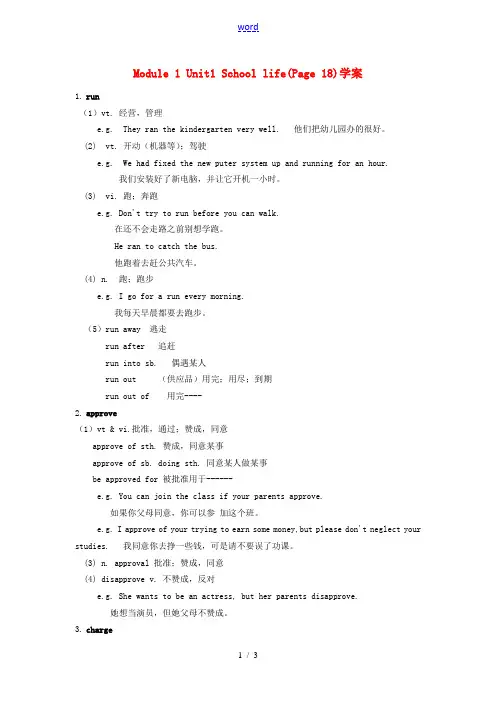
Module 1 Unit1 School life(Page 18)学案1.run(1)vt. 经营,管理e.g. They ran the kindergarten very well. 他们把幼儿园办的很好。
(2) vt. 开动(机器等);驾驶e.g. We had fixed the new puter system up and running for an hour.我们安装好了新电脑,并让它开机一小时。
(3) vi. 跑;奔跑e.g. Don't try to run before you can walk.在还不会走路之前别想学跑。
He ran to catch the bus.他跑着去赶公共汽车。
(4) n. 跑;跑步e.g. I go for a run every morning.我每天早晨都要去跑步。
(5)run away 逃走run after 追赶run into sb. 偶遇某人run out (供应品)用完;用尽;到期run out of 用完----2.approve(1)vt & vi.批准,通过;赞成,同意approve of sth. 赞成,同意某事approve of sb. doing sth. 同意某人做某事be approved for 被批准用于------e.g. You can join the class if your parents approve.如果你父母同意,你可以参加这个班。
e.g. I approve of your trying to earn some money,but please don't neglect your studies. 我同意你去挣一些钱,可是请不要误了功课。
(3) n. approval 批准;赞成,同意(4) disapprove v. 不赞成,反对e.g. She wants to be an actress, but her parents disapprove.她想当演员,但她父母不赞成。
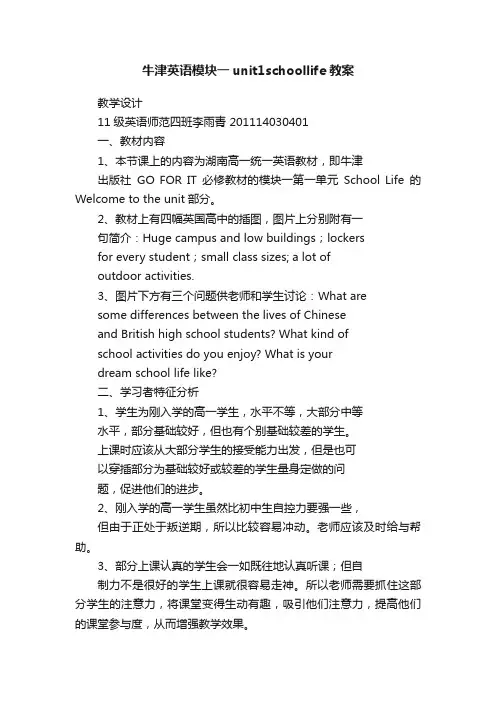
牛津英语模块一unit1schoollife教案教学设计11级英语师范四班李雨青 201114030401一、教材内容1、本节课上的内容为湖南高一统一英语教材,即牛津出版社GO FOR IT必修教材的模块一第一单元School Life的Welcome to the unit部分。
2、教材上有四幅英国高中的插图,图片上分别附有一句简介:Huge campus and low buildings;lockersfor every student;small class sizes; a lot ofoutdoor activities.3、图片下方有三个问题供老师和学生讨论:What aresome differences between the lives of Chineseand British high school students? What kind ofschool activities do you enjoy? What is yourdream school life like?二、学习者特征分析1、学生为刚入学的高一学生,水平不等,大部分中等水平,部分基础较好,但也有个别基础较差的学生。
上课时应该从大部分学生的接受能力出发,但是也可以穿插部分为基础较好或较差的学生量身定做的问题,促进他们的进步。
2、刚入学的高一学生虽然比初中生自控力要强一些,但由于正处于叛逆期,所以比较容易冲动。
老师应该及时给与帮助。
3、部分上课认真的学生会一如既往地认真听课;但自制力不是很好的学生上课就很容易走神。
所以老师需要抓住这部分学生的注意力,将课堂变得生动有趣,吸引他们注意力,提高他们的课堂参与度,从而增强教学效果。
三、教学(学习)目标1、使学生掌握基本的关于学校设备的单词。
2、使学生从初中过渡到高中,认识到初中和高中的区别。
3、使学生认识到中国高中和英国高中的区别。
4、使学生能用英语大致地表达出自己的想法。
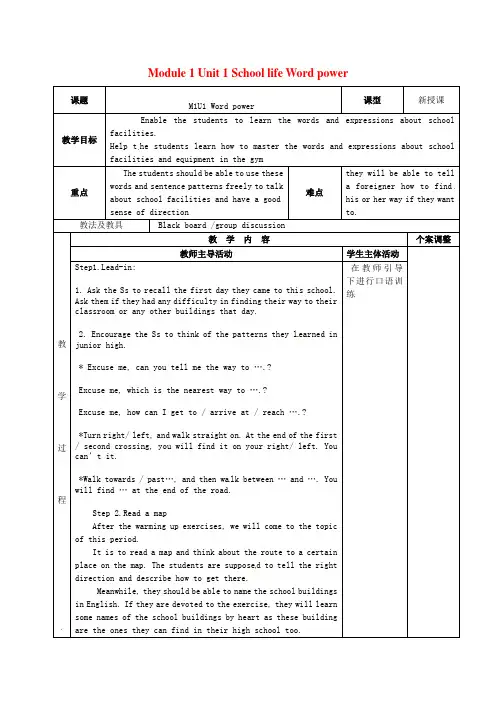
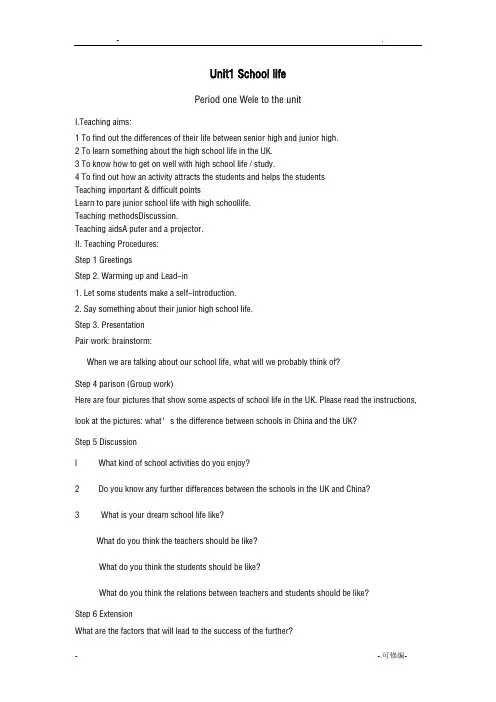
Unit1 School lifePeriod one Wele to the unitI.Teaching aims:1 To find out the differences of their life between senior high and junior high.2 To learn something about the high school life in the UK.3 To know how to get on well with high school life / study.4 To find out how an activity attracts the students and helps the studentsTeaching important & difficult pointsLearn to pare junior school life with high schoollife.Teaching methodsDiscussion.Teaching aidsA puter and a projector.II. Teaching Procedures:Step 1 GreetingsStep 2. Warming up and Lead-in1. Let some students make a self-introduction.2. Say something about their junior high school life.Step 3. PresentationPair work: brainstorm:When we are talking about our school life, what will we probably think of?Step 4 parison (Group work)Here are four pictures that show some aspects of school life in the UK. Please read the instructions, look at the pictures: what’s the difference between schools in China and the UK?Step 5 Discussionl What kind of school activities do you enjoy?2Do you know any further differences between the schools in the UK and China?3What is your dream school life like?What do you think the teachers should be like?What do you think the students should be like?What do you think the relations between teachers and students should be like?Step 6 ExtensionWhat are the factors that will lead to the success of the further?Step 7 SummaryHomework1) Recall all the new words and expressions that appear in this unit.2) Write a short passage about your dream school. (100words)3) Preview the following lesson.Period 2 ReadingTeaching aims:1. To read a magazine article about school life in the UK.2. To learn to apply two basic reading skills: skimming and scanning.3. To learn some expressions about school life.Teaching Important Points:Help the students to understand the passage better.Learn and master some important words and phrases in this period.Teaching Difficult Point:How to help the students improve their reading ability and understand the passage better.How to master the important language points in this passage.Teaching Methods: Fast reading ,Careful reading, DiscussionExplanation to help the students master some language points.Teaching Aids:A tape recorder.A multimedia.Teaching procedures:Step 1 RevisionCheck the homework exercise.Step 2 PresentationYesterday we discussed the differences between high schools in our country and the UK.Now we are going to read a magazine article which is written by an exchanging student. She has been studying in the UK for one year. Now she gives a clear brief introduction about her school life there.Before we read the article, we are going to learn the reading strategy: skimming and scanning. Skimming: to get a general idea of the article.Scanning: to locate specific information about an article.Step 3 Reading1. Skimming question:How does Wei Hua feel about her life in the UK?2. Scanning:1)What topics are mentioned in the WeiHua’s letter?(opt. are the following aspects of school life mentioned in the article?Teachers classmates friends subjects homework grades timetable activities school facilities host family food hobbies customs traditions festivals)2)Scan the passage and plete Part C1, C2 on page 4Step 4 Group workWhat’s the similarity and difference between the schools in China and the UK?Step 5 Practice:Pair workNow you are a reporter from the school magazine, and have a chance to interview Wei Hua. What other information would you like to know about her life and study in the UK?Suppose your desk mate is Wei Hua, make a dialogue.Homework.1. plete parts D and E2. Read the two articles in reading on pages 82 and 83 in wb and answers the questions below them.3. Daniel Adams will e to your school as an exchange student. Write a letter to him and introduce your school life to him.4. Preview the following lesson.Period 3-4 Language focusTeaching aims:To learn some expressions about school life.Teaching Important Points:Help the students to understand the passage better.Learn and master some important words and phrases in this period.Teaching Difficult Point:How to help the students understand the passage better.How to master the important language points in this passage.Teaching Methods: Explanation to help the students master some language points.Teaching Aids:A tape recorder. A multimedia.Step 1 Revision:1. Check the homework2. plete the chart and retell the letter.Step 2. Language focus1. Words:a)attend (join / join in / take part in )b)preparec)miss (missing / gone / lost)d)experiencee)informationf)sounds2. Phrases:a)for freeb)a bit / a littlec)as well as3. Sentences:a)Going to a British school for one year has been a very enjoyable and exciting experience for me.b)I do like eating.Step 5. Practice1. plete wb A1, A2,2. Translation1)Jim加入了我们的讨论之列。
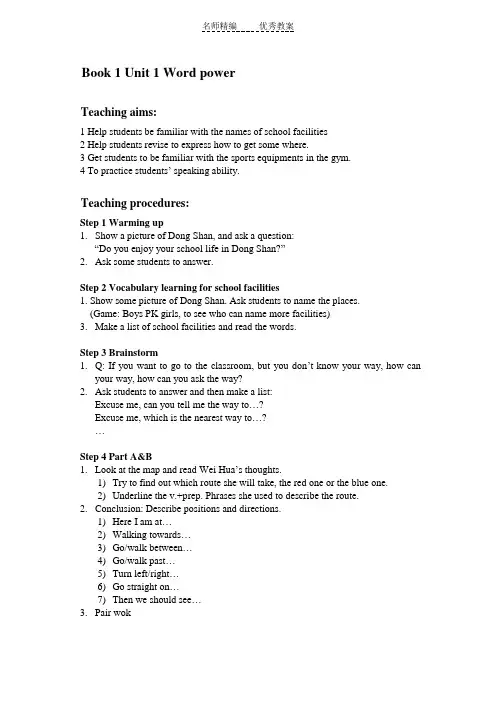
Book 1 Unit 1 Word powerTeaching aims:1 Help students be familiar with the names of school facilities2 Help students revise to express how to get some where.3 Get students to be familiar with the sports equipments in the gym.4 To practice students’ speaking ability.Teaching procedures:Step 1 Warming up1.Show a picture of Dong Shan, and ask a question:“Do you enjoy your school life in Dong Shan?”2.Ask some students to answer.Step 2 Vocabulary learning for school facilities1. Show some picture of Dong Shan. Ask students to name the places.(Game: Boys PK girls, to see who can name more facilities)3.Make a list of school facilities and read the words.Step 3 Brainstorm1.Q: If you want to go to the classroom, but you don’t know your way, how canyour way, how can you ask the way?2.Ask students to answer and then make a list:Excuse me, can you tell me the way to…?Excuse me, which is the nearest way to…?…Step 4 Part A&B1.Look at the map and read Wei Hua’s thoughts.1)Try to find out which route she will take, the red one or the blue one.2)Underline the v.+prep. Phrases she used to describe the route.2.Conclusion: Describe positions and directions.1)Here I am at…2)Walking towards…3)Go/walk between…4)Go/walk past…5)Turn left/right…6)Go straight on…7)Then we should see…3.Pair wokAsk students to read the guidelines of Part B, and finish the writing description of the quickest way to get from the dormitories to Classroom 4. Then get each of them to read their passage to their partner. And then ask some of them to read their passage to the whole class.Sample answers:(B) If you are standing at the door of the dormitories, first turn right and go past the medical centre and the gym, then turn left and walk until the end of the road. Classroom is on your left.4. Design some more samples for the students to practice. For example, ask students to mark the shortest way from the science laboratory to classrooms 16-25. This exercise encourages students to familiarize the phrases of finding the way. (If time doesn’t permit, this step can be left out.)5. Ask students to finish Part C individually, and then check the answers with the whole class.Answers:(C) 1 car park 2 classrooms 3 library 4 labs 5 gym 6 swimming pool 7 dormitories 8 medical centre 9 canteenStep 5 Vocabulary extension1. Lead in.Q: For all the school facilities, which one do you like best?Ss: …T: I liked to go the gym most, when I was in my university, I can do sports there and keep fit. There are many kinds of sports equipments in the gym.2. Show a picture of the gym.3. Ask students to read the guidelines of Part D. Then get them to look at the words under the picture and guess the meaning of each word. They can first write down the number of the words of which they know the meanings before these words. Then guide students to guess the meanings of the words they don’t know.Answers:(D) 4 beam 7 barbell 1 climbing bars 6 basketball court 2 rings 8 mat 3 dumb-bell 5 skipping rope2 Ask students to read the words that appear in this part and try to learn them by heart. Step 6 Discussion1.If we will build a new big gym in Dong Shan, what kinds of equipments or courtsshould be included in your opinion?2.Ask students to discussion the above topic in groups, and then ask some of themto show their results.Step 7 Homework1. Let the students to remember all the useful words and expressions in Part A, B, andD .2. Ask the students to make a map of Dong Shan Senior High School.名师精编优秀教案。
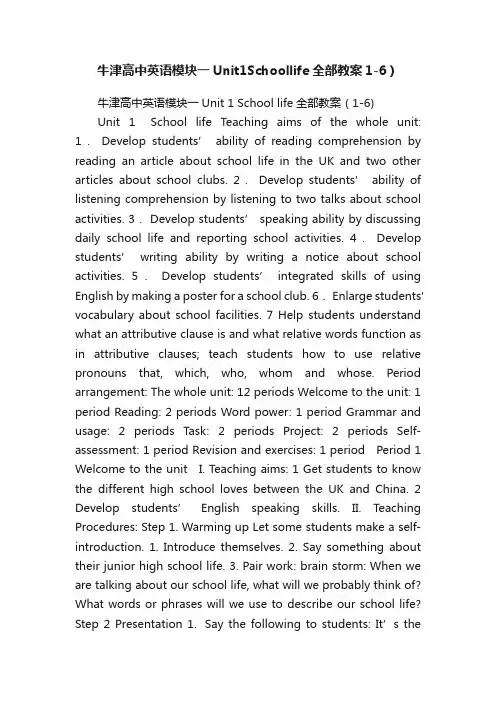
牛津高中英语模块一Unit1Schoollife全部教案1-6)牛津高中英语模块一Unit 1 School life全部教案(1-6)Unit 1 School life Teaching aims of the whole unit: 1.Develop students’ ability of reading comprehension by reading an article about school life in the UK and two other articles about school clubs. 2.Develop students’ ability of listening comprehension by listening to two talks about school activities. 3. D evelop students’ speaking ability by discussing daily school life and reporting school activities. 4.Develop students’ writing ability by writing a notice about school activities. 5.Develop students’ integrated skills of using English by making a poster for a school club. 6.Enlarge students’ vocabulary about school facilities. 7 Help students understand what an attributive clause is and what relative words function as in attributive clauses; teach students how to use relative pronouns that, which, who, whom and whose. Period arrangement: The whole unit: 12 periods Welcome to the unit: 1 period Reading: 2 periods Word power: 1 period Grammar and usage: 2 periods Task: 2 periods Project: 2 periods Self-assessment: 1 period Revision and exercises: 1 period Period 1 Welcome to the unit I. Teaching aims: 1 Get students to know the different high school loves between the UK and China. 2 Develop students’ English speaking skills. II. Teaching Procedures: Step 1. Warming up Let some students make a self-introduction. 1. Introduce themselves. 2. Say something about their junior high school life. 3. Pair work: brain storm: When we are talking about our school life, what will we probably think of? What words or phrases will we use to describe our school life? Step 2 Presentation 1. Say the following to students: It’s thebeginning of the new term. You’ve just finished your junior high and are about to enter a new period in your studies. I am happy to give your lessons and I hope we can be friends. I can see that some of your are eager to know what studying at senior high will be like. Will it be differ4ent from junior high? Well, there are certainly many differences between junior high and senior high, but there are also some things that are the same in every school in China. What about schools in other countries? Do you have different experiences? Are schools all over the world the same? This is the subject of our first unit. 2. Ask students to read the instruction and tell them: Here are three pictures that show some aspects of school life in the UK. Please read the instructions, look at the pictures: whats the difference between schools in China and the UK? Step 3 Discussion 1 Ask students the following questions to talk about the words in the four pictures: Huge campus and low-rise buildings What does huge mean? What does low-rise mean? What about campus and school buildings in China? (Schools in China usually have a large enough campus to make sure students have enough space to study and play. But most school buildings have at least 3 storeys.) Lockers for every student Do you know what a locker is? (There are rows of lockers by the classrooms for students to put their bookd, exercise-books and other belongings.) What do you think about locker for students? Do you think that we should have such locker in our school? Why or Why not? Fewer students in each class How many students are there in our class? Do you know the number of students in a class in the UK? At ease with our teacher What can we know from this picture? What does the word ease mean? What do you think the phrase at ease mean? Were you getting on well with the teacher when you were in junior high? Whatrelationship do you want to have with your teachers in senior high? 2 Ask students to work in groups to talk about the four pictures and the differences between schools in the UK and China. Then ask several students to report their discussion to the whole class. aspects In the UK In China Huge campus and low-rise buildings We can see huge campus and low-rise buildings. It is the biggest difference from schools in China Schools in China usually have a large enough campus to make sure students have enough space to study and play in. But most school buildings are taller, at least three storeys. Lockers for every student There are rows of lockers by the classrooms for students to put their stationary, books, exercise-books and other belongings. Students bring what they need for lessons to school and then take it all back home after school. Most schools in china do not have equipment in the classroom. Fewer students in each class There are fewer students in a class, no more than 30 per class. There are usually more students in high school, perhaps 40 to 50 per class. Recently some schools are beginning to limit the number of students in each class. At ease with our teacher Students have a close relationship with their teachers. They feel at ease and comfortable with them. It is similar in china. Nowadays, lots of teachers and students have established a good relationship with each other. They respect each other and work to gain a better understanding of each other. 3. Ask students to discuss the three questions in pairs, and them ask some of them to report their answers to the questions to the whole class. What is your dream school life like? What kind of school activities do you enjoy? What do you think of your life here in the new school? Step 4 Summary and Homework Today we’ve mainly talked about the differences between the high school lives in theUK and in China. After class you should: 1) Recall all the new words and expressions that we learn in this lesson. 2) Find more about any other differences between the high school lives in the UK and in China, either by surf the Internet or by reading some articles in newspapers or magazines. 3) Preview the following part: reading (page 2 to page 4). Period 2 Reading (1) School life in the UK Teaching aims: 1. Get students to know what school life is like in a high school in the UK. 2. Develop students’ ability of reading comprehension through: 1) skimming and scanning. 2) Guessing the meanings of some new words from the context 3. To learn some expressions about school life. Teaching procedures: Step 1 Lead-in and Presentation Say the following to the students: Yesterday we’ve talked about the differences between the high school lives in the UK and in China. We know well about the high school lives in China, because we are Chinese. But we know a little about the high school lives in the UK. Yeah? Today we are going to read a magazine article which is written by an exchanging student. She has been studying in the UK for one year. Now she gives a clear brief introduction about her school life there.(Bb: School life in the UK) Before we read the article, we are going to learn the reading strategy: skimming and scanning. Please look at page 3: Reading strategy. (Bb the following while learning the reading strategy. ) Skimming: to get a general idea of the article, without studying it in detail. Focus on the titles, headings, the first and last sentences or paragraphs, charts and pictures … scanning: to find certain information in an article quickly. Look for key words and phrases, dates and numbers, etc. Step 2. Reading 1. Skimming: Question: How does Wei Hua feel about her life in the UK? 2. Scanning: 1) Ask students to go through the three questions in part A andmake sure that each of them know the meaning of each question.(A Woodwork class is a class in which students make something from wood.) Ask students to read the passage as quickly as possible and try to find answers to the three questions. Remind students only to focus on and identify the most important information. 2) Ask student to reread the passage and complete Part C1 individually. Then ask some of them to give the answers to the questions in Part C1。
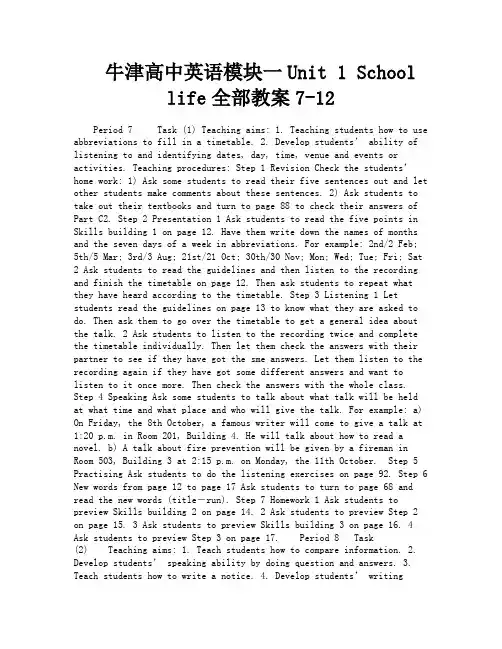
牛津高中英语模块一Unit 1 Schoollife全部教案7-12Period 7 Task (1) Teaching aims: 1. Teaching students how to use abbreviations to fill in a timetable. 2. Develop students’ ability of listening to and identifying dates, day, time, venue and events or activities. Teaching procedures: Step 1 Revision Che ck the students’ home work: 1) Ask some students to read their five sentences out and let other students make comments about these sentences. 2) Ask students to take out their textbooks and turn to page 88 to check their answers of Part C2. Step 2 Presentation 1 Ask students to read the five points in Skills building 1 on page 12. Have them write down the names of months and the seven days of a week in abbreviations. For example: 2nd/2 Feb; 5th/5 Mar; 3rd/3 Aug; 21st/21 Oct; 30th/30 Nov; Mon; Wed; Tue; Fri; Sat 2 Ask students to read the guidelines and then listen to the recording and finish the timetable on page 12. Then ask students to repeat what they have heard according to the timetable. Step 3 Listening 1 Let students read the guidelines on page 13 to know what they are asked to do. Then ask them to go over the timetable to get a general idea about the talk. 2 Ask students to listen to the recording twice and complete the timetable individually. Then let them check the answers with their partner to see if they have got the sme answers. Let them listen to the recording again if they have got some different answers and want to listen to it once more. Then check the answers with the whole class. Step 4 Speaking Ask some students to talk about what talk will be held at what time and what place and who will give the talk. For example: a) On Friday, the 8th October, a famous writer will come to give a talk at 1:20 p.m. in Room 201, Building 4. He will talk about how to read a novel. b) A talk about fire prevention will be given by a fireman in Room 503, Building 3 at 2:15 p.m. on Monday, the 11th October. Step 5 Practising Ask students to do the listening exercises on page 92. Step 6 New words from page 12 to page 17 Ask students to turn to page 68 and read the new words (title―run). Step 7 Homework 1 Ask students to preview Skills building 2 on page 14. 2 Ask students to preview Step 2 on page 15. 3 Ask students to preview Skills building 3 on page 16. 4 Ask students to preview Step 3 on page 17. Period 8 Task(2) Teaching aims: 1. Teach students how to compare information. 2. Develop students’ speaking ability by doing question and answers. 3. Teach students how to write a notice. 4. Develop students’ writingability by writing a notice to inform their classmates. Teaching procedures: I Skills building 2 and Step 2 Step 1 Presentation 1 Ask students whether they could understand the meaning of each sentence in Skills building 2 when they were doing previewing. Let them point out sentences that they don’t u nderstand. 2 Ask students to read the guidelines and the two points again. Write down the two points briefly on the blackboard: When comparing: 1) read all the in formationcarefully 2) make as many comparison as possible Step 2 Practising 1 Ask students to read the guidelines above the list table to know clearly what they are asked to do. Then ask them to go over the list table. 2 Write down the following on the blackboard. Ask students to read the e-mail and find out the related information: The title: The price: The year: The writer: Ask some students to tell what information they can find about the above in the e-mail, and write down their answers on the blackboard. The title: with the word Dynasties The price: having the figure 8 The year: after 2000 The writer: a famous professor Ask students to compare the information written on the blackboard with the list table to see if they can find the book now. Step 3 Reporting 1 Ask students to read the guidelines and the class timetable in Part A in Step 2 and underline the classes that they can choose not to have. Then let them compare the timetable on page 13 with the class timetable and write down the topics of the talks they can attend under the class timetable. 2 Ask students to read the guidelines in Part B and work in pairs talking about the talks according to the programme time table on page 13 and the note in Part A. One of them acts as the class teaching, the other act as the monitor. They should take turns. II Skills building 3 and Step 3 Step 1 Presentation 1 Say the following to students: Now, you are going to write a notice to inform your classmates of the talks that they are going to attend. Do you know how to write the notice and what should be included in it. (Write down their answers on the blackboard.) 2 Ask students to read the guidelines and the three points in Skills building 3. Let them compare the three points with their answers on the blackboard. 3 Ask students to read the notice on page 16 and tell what they can know from the notice. Ask them to point out the important information in it. The important information(Write the following on the blackboard): Event: Library closed Time: next Wednesday to Friday, 16th to 18th November Reason: for the sports meeting When to reopen: for the sports me eting The new opening hours: Monday―Friday: 8 a.m.―6 p.m. Saturday & Sunday: 10a.m.―5 p.m. Public holidays: closed Person that gives the notice: Zhong Shengxiao, a staff member of the school library 4 Let students talk about what to do to make a noticeattractive. For example, the notice should be written in big and colour words, and one or two pictures or photos are used, etc. Step 2 Writing 1 Ask students to read the guidelines in Step 3 and know what to write in the notice. 2. Ask students to write a notice about the talks in October individually. Then ask two students to present their notices on the blackboard. Ask other students to make comments about these notices.(If time doesn’t permit, let the students write the notice in theirexercise-books after class.) III Homework Ask students to preview Part Project. Period 9 Teaching aims: 1 Help students get some information about after-school activities and school clubs. 2 Develop students’ reading ability. 3 Develop students’ integrated skills of using English. 4 Help student know how to cooperate in order to fulfilla task. Teaching Procedures: Step 1 Presentation Say the following to students: We’ve talked about what kind of school activities you enjoyin Welcome to the unit. In order to hold school activities conveniently, schools often have some clubs, for example football club, English club, radio club and so on. Do our school have some school clubs? (Yes.) Today, we are going to read two articles about school clubs. Please turn to page 18, look at Part A in Project: Starting a new school club. Step 2 Reading 1 Ask students to read the first passage and find out as much information as they can about the radio club. For example: Who started the radio club: (Kate Jones, the writer) When the radio club started: (two years ago) Why the radio club started: (CD players were not allowed in school; to play music during break time.) What the radio club does: every morning: (tell about the weather, the recent news, special messages the teachers want to broadcast) during exam time: (the special programme telling students what should do and what shouldn’t do) wt the end of the school year: (graduating students giving messages to their friends and teachers) when parents come: (playing songs sung by students, special messages to inform events) 2 Ask students to read the second passage and find out as nuch information as they can about it. The name of the school club: (Poets of the Next Generation) Who started theschool club: (Mr. Owen, the English teacher) When the members of the school club meet: (the last Friday of every month) What the members of the school club do: (talk about poems and poets they like, select poems, read out aloud, write poems and read out) 3 Give students the explanations of。
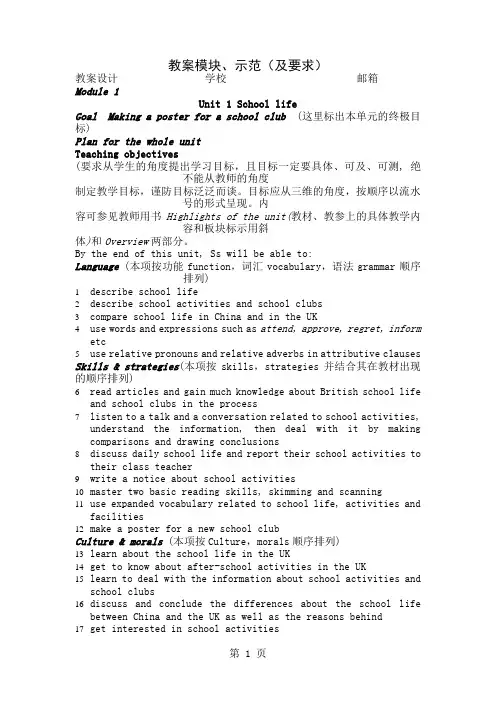
教案模块、示范(及要求)教案设计学校邮箱Module 1Unit 1 School lifeGoal Making a poster for a school club (这里标出本单元的终极目标)Plan for the whole unitTeaching objectives(要求从学生的角度提出学习目标,且目标一定要具体、可及、可测, 绝不能从教师的角度制定教学目标,谨防目标泛泛而谈。
目标应从三维的角度,按顺序以流水号的形式呈现。
内容可参见教师用书Highlights of the unit(教材、教参上的具体教学内容和板块标示用斜体)和Overview两部分。
By the end of this unit, Ss will be able to:Language (本项按功能function,词汇vocabulary,语法grammar顺序排列)1describe school life2describe school activities and school clubs3compare school life in China and in the UK4use words and expressions such as attend, approve, regret, inform etc5use relative pronouns and relative adverbs in attributive clauses Skills & strategies(本项按skills,strategies并结合其在教材出现的顺序排列)6read articles and gain much knowledge about British school life and school clubs in the process7listen to a talk and a conversation related to school activities, understand the information, then deal with it by making comparisons and drawing conclusions8discuss daily school life and report their school activities to their class teacher9write a notice about school activities10master two basic reading skills, skimming and scanning11use expanded vocabulary related to school life, activities and facilities12make a poster for a new school clubCulture & morals (本项按Culture,morals顺序排列)13learn about the school life in the UK14get to know about after-school activities in the UK15learn to deal with the information about school activities and school clubs16discuss and conclude the differences about the school life between China and the UK as well as the reasons behind17get interested in school activities18make good use of school daysOverview(内容参见教师用书Overview部分。
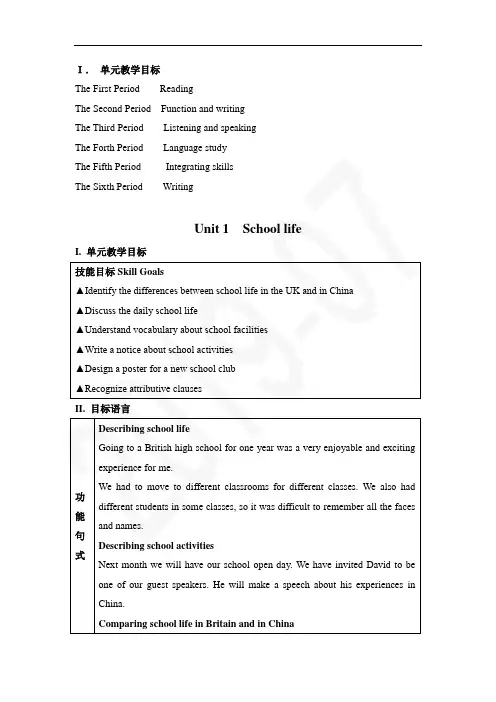
I.单元教学目标The First Period ReadingThe Second Period Function and writing The Third Period Listening and speaking The Forth Period Language studyⅢ. 教材分析与教材重组1. 教材分析本单元以School life为话题,旨在通过单元教学使学生了解英国校园生活的一些基本情况及中英两国校园生活的不同之处;学习并能运用表示校园设施的一些基本词汇;学习定语从句的基本概念及关系代词的用法;能就校园活动的话题展开讨论;能就校园活动情况向班任老师做出报告;学习通知的写法;学会设计以介绍学校俱乐部为主题的海报等。
1.1 Welcome to the unit 部分利用四幅图片,分别从(校园风貌、生活设施、课堂教学、师生关系)四个不同的侧面介绍了英国校园生活的有关情况。
该部分还设计了三个讨论话题,引导学生对中英两国校园生活进行比较,并就相关话题发表自己的看法。
1.2 Reading部分的短文节选自一份校园杂志。
文章由一位交换留学生所写。
作者通过自己的亲身经历简要地介绍了英国学校生活的一些情况。
文章前后分别设计了五个部分的练习:前两个练习(A、B)要求学生运用本单元介绍的两种基本阅读方法(skimming and scanning)阅读文章,把握文章主旨大意,了解文中明显的细节内容;练习C1通过问题的形式考查学生对文中具体信息的把握程度;C2通过判断正误练习加深学生对阅读材料的理解;D部分为词汇练习,要求学生首先联系上下文猜测所给词汇的含义;然后通过配对练习帮助学生掌握新词的含义和用法;E部分要求学生通过运用所给词汇填空的方式完成一封英国学生写给Wei Hua的信件,以进一步加深学生对阅读内容的理解;练习F设计了两个话题,引导学生对校园生活有关话题展开讨论,以获得对文章深层次的理解。
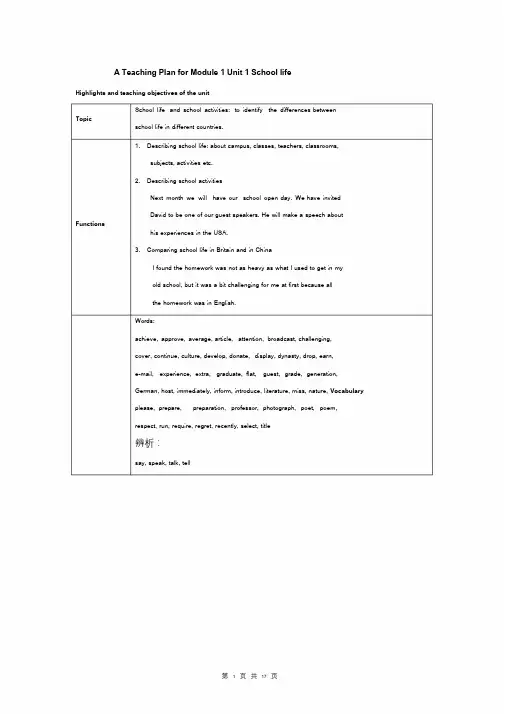
A Teaching Plan for Module 1 Unit 1 School life Highlights and teaching objectives of the unitTopic S chool life and school activities: to identify the differences between school life in different countries.1. Describing school life: about campus, classes, teachers, classrooms,subjects, activities etc.2. Describing school activitiesNext month we will have our school open day. We have invitedFunctionsD avid to be one of our guest speakers. He will make a speech abouthis experiences in the USA.3. Comparing school life in Britain and in ChinaI found the homework was not as heavy as what I used to get in myold school, but it was a bit challenging for me at first because allthe homework was in English.Words:achieve, approve, average, article, attention, broadcast, challenging, cover, continue, culture, develop, donate, display, dynasty, drop, earn,e-mail, experience, extra, graduate, flat, guest, grade, generation, German, host, immediately, inform, introduce, literature, miss, nature, Vocabulary please, prepare, preparation, professor, photograph, poet, poem, respect, run, require, regret, recently, select, title辨析:say, speak, talk, tell第 1 页共17 页Phrases:1. attend / take part in a lecture2. earn one ’s r e s p3e.c a t chieve highgrades4. English literature5. on (an/the) average6. an enjoyableexperience7.be happy / pleased/ content with 8. the way to do/of doing sth.9. sound like a good idea 10. used to do sth 11. be used to gettingup early12. spend ⋯(in) doing sth. 13. for free / nothing14. drop/give up some subjects 15. develop (an) interest in sth.16. take a photograph of 17. donate ⋯to ⋯18. on display / on show 19. make a speech/lecture20. pay attention to doing sth 21. be open to/for all the students22. inform sb. of/about sth. 23. go for an outing24. graduate from a key middle school 25. on/upon finishing studies26. start /set up a school club 27. approve of the idea28. require sb. to do sth. 29. the swimming pool30. a modern medical center1. He also told us that the best way to earn respect from the schoolwas to work hard and achieve high grades.2. This sounded likemy school in China.3. I found the homework was not as heavy as what Iused toget in myold school, ⋯Sentence4. Though it didn ’t look like a table when it was f i n d i s,h I e sti l liked it patternsvery much.5. I do like eating desserts after meals as you mentioned in yourarticle.6. Upon finishing his studies, he started traveling in China.7. “祈使句,and you will ⋯”第2页共17 页1. Introduction to attributive clausesShe was the teacher who taught us English literature.2. Relative pronouns:that, which, who, whom a nd w hose Grammar All my classmates enjoyed the cake that/which I made.The girl (that/who/whom) you have just seen is very good atEnglish.I sat nest to a girl whose name was Diane.1. Reading: read a magazine article about school life in the UK andSkills and strategiestwo other articles about school clubs2. Listening: listen to a headmaster talking about school activities3. Speaking: talk about daily school life and report their activities4. Writing: Write a notice about school activities1. School life in the UKCulture 2. After-school activities in the UK3. School activities and school clubsTeaching methods:1. Discussions in pairs or in groups2. Task-based in class activities.3. Explanations of some language points and grammar rules.Period 1 VocabularyTeaching aim:To learn the new words and expressions in this unit.Teaching Procedures:Step 1 ReadingBegin the first lesson like this: Good morning, everyone. Nice to see you. Nowthe new term has begun and you have entered a new period in your studies. I am veryhappy to have all of you in my class and I ’m sure we will be good friends and we will succeed, because you are such good students and to tell you the truth, I ’m a ver teacher, too. First, let me introduce myself. My name is Wang Qingguang ( 王庆光).So let ’wsork hard together to realize our common goal, that is, all of you will beadmitted into key universities three years later. But as the saying goes, “to cle whole world, you must tidy your own room first. ”So now let ’l e s s s g o e n t,down to our第 3 页共17 页Unit 1. First, let ’s l e a t r h n e new words. Please turn to page 68. I ’l g l i ve you a few minutes; please practice reading them aloud. Then I ’l y a o s u k t o s o s m t a e n d o f u pand read them. Start!Ask a few students to stand up and read the new words. Correct any mistakes in pronunciation.Step 2 ExercisesDo the vocabulary exercises in the printing materialHomework1. Read aloud the new words in Unit 1 and finish the vocabulary exercises o n thelearning plan.2. Preview the reading passage.Period 2 Welcome to the unitTeaching aims:1. To revise the new words by doing some exercises.2. To introduce and develop the theme of school life, especially to get the students toknow of differences between high school life and junior school life as well as toidentify the differences between school life in different countries.3. To develop the students ’listening and speaking abilities by talking about the fourpictures on page 1. and their new life and hope in the new school.Teaching Procedures:Step 1 RevisionRevise the vocabulary by doing the exercises on the learning plan.Step 2 Comparison and discussionPage 1. High school is a time of discovery, learning and hard work! Look at the pictures below. They show some parts of high school life in the UK. Discuss the following questions with your partner.1. Do you know of any differences between the lives of Chinese and British high school students? (You may refer to the four pictures above while discussing this question.)2. What kind of school activities do you enjoy?3. What is your dream school life like?Sample answers:1.第 4 页共17 页aspects In the UK In ChinaIn the UK, we can seeCampus and buildingsh uge campus and low-risebuildings. (The schoolyard is very big, but theclassroom buildings arerather low, just likehouses.)It is the biggest differenceSchools in China usually have a largecampus, too, so that it will make sureall the students have enough space tostudy and play in. But most schoolbuildings are taller, at least three orfour storeys.from schools in ChinaIn the UK, there are rowsWhether to haveof lockers by/outside the While in China, students have to lockers (n. smallclassrooms for students to bring their schoolbags t o school and cupboard 寄物put their stationary, books, then take them all back home after 柜) for every exercise-books and other school. Most schools in China do notbelongings/articles / have lockers in the classroom.studentthings.Number of students in each class I n the UK, there are fewerstudents in a class, nomore than 30 per class.W hile in China we have about 40, 50or even 60 students in each class,which makes both teaching andlearning more difficult.In the UK, students have a It is similar in China. Generallyclose relationship with speaking, students and teachers a retheir teachers. They feel at like friends. They have alsoease and comfortable with established a good relationship withthem. In most cases, each other. Of course, there are someRelation with teachers treat students as teachers who are too hard on theirtheir teachers their equals. In the class, students, f or example, some teachersthere will be more ask their students to copy theirdiscussions, and students mistakes for one thousand times;are encouraged to Worse still, some teacherseven beatparticipate in them. their students in the face, and so on, Idon’tthink it is good. Teachersand第 5 页共17 页students should respect each other,shouldn ’t we?2. sports a ctivities: like a sports meeting, where you can display your specialtalents in sports, like running, high jump, long/broad jump, rope jump bui⋯ld ;upyour body, make you more energetic, ⋯singing a nd dancing: make your school life richer and more beautiful; it canmake you forget about your trouble; relax yourself, ⋯art festivals, English evenings:Speeches by famous professors or foreigners:3. My idea school life would be something like this: teachers a nd students aregood friends. Students a re treated as equal persons. After class, there won’tbe toomuch homework, or too many examinations. So we students have more free time todevelop our own interests in different areas, s uch as computer science, s inging anddancing. My dream school will also hold a lot of activities, such as English festivals,sports meetings, singing competitions and so on.Step 3 ActivityAsk the students to describe a good teacher in their mind, and make a vivid description about a good student in their view, together with the ideal relationshipbetween teachers and students. Teacher may ask some questions, for example:1. What kind of teachers do you like best in your mind? What characters does agood teacher should have in your opinion?2. In your opinion, what kind of students can be regarded as good students?3. What relationship between teachers and students should we have?Sample answers:To question 1:S: I hope my teachers can have a strong sense of humour.S: If teachers can treat every student equally, I think we will all love them.S: We hope we can learn a lot of knowledge from teachers, so I think teacherswho are learned must be very popular among us.To question 2:S: A good student must be clever, open-minded and are ready to help others.S: First of all, a good student must be full of energy, competitive and civilizedS: He or she should have good manners.第6页共17 页。
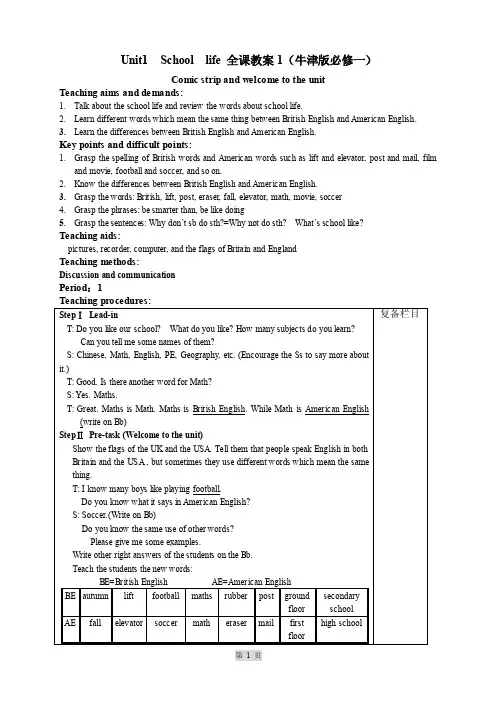
Unit1 School life 全课教案1(牛津版必修一)Comic strip and welcome to the unitTeaching aims and demands:1.Talk about the school life and review the words about school life.2.Learn different words which mean the same thing between British English and American English.3.Learn the differences between British English and American English.Key points and difficult points:1.Grasp the spelling of British words and American words such as lift and elevator, post and mail, filmand movie, football and soccer, and so on.2.Know the differences between British English and American English.3.Grasp the words: British, lift, post, eraser, fall, elevator, math, movie, soccer4.Grasp the phrases: be smarter than, be like doing5.Grasp the sentences: Why don‟t sb do sth?=Why not do sth? What‟s school like?Teaching aids:pictures, recorder, computer, and the flags of Britain and EnglandTeaching methods:Discussion and communicationPeriod:1Reading(1)Teaching aims and demands:1.Know the school lives in British school and American school.2.Learn to read and understand the article with different ways of reading.3.Learn how to understand the writer‟s opinion.Key points and difficult points:1. Know the meanings of the new words: mixed, together, subject, myself, tasty, meal, guy(s), twice, softball, practice, buddy, senior, hero, close, article, admire2. Understand the meanings of the phrases: in Y ear 8=in Grade 8,a mixed school, Home Economics, learn how to do sth, do sth for oneself, cook healthy and tasty meals, bring in, a Reading Week, the end of sth, as well, take a bus, twice a week, spend time doing sth, learn about, help sb with sth, each other, have a great time doing sth.3. Can use this sentence: What does the word …hero‟ mean?It means someone you admire very much.Catch the main information about Lives in a British school and an American schoolTeaching aids: Recorder and computerTeaching methods: Asking and answering questions, communication and discussion Period:2Reading 2Teaching aims and demands:1.Can grasp the words, phrases and language points of the two articles.2. Can retell the lives in a British school and an American school.Key points and difficult points:1. Some important language points.2. Retell the two articles completely.Teaching aids: Recorder, a small blackboardTeaching methods: Explanation and exercisePeriod:3Period:9-4Teaching aims and demands:1.Learn about the school subjects.2.Review and learn the adjective nouns about people‟s opinion.3.Grasp the opposites of the adjective nouns.Key points and difficult points:1. Grasp the new words such as art, geography, language, PE, science, useful, unimportant, useless,unpopular and so on.2. Can give opinion on different school subjects.Teaching aids: Computer and the timetableTeaching methods: Summarize and explanationPeriod:9-4Grammar A&BTeaching aims and demands:pare two things using …more…than‟, …fewer…than‟ and …less…than‟.2. Compare more than two things using …the most‟ for the largest amount and …the fewest‟/ …theleast‟ for the smallest amount.Key points and difficult points:1.How to use …more…than‟, …fewer…than‟ and …less…than‟.2.How to use …the most‟ …the fewest‟ and …the least‟. Teaching aids:Teaching methods: pictures, objects and computer Period:5Grammar C& CheckoutTeaching aims and demands:1.Can make comparisons using …the same as‟ and …different from‟.2.Can make comparisons using …the same…as‟.Key points and difficult points:Grasp the sentences like these: My uniform is the same as Simon‟s uniform.My uniform is different from John‟s uniform.Millie‟s pencil box is the same size as Amy‟s pencil box. Teaching aids: Objects and picturesTeaching methods: Exercise and explanationPeriod:6Teaching procedures:Integrated skills (A)Teaching aims and demands:1.Listen to the conversation and try to collect the information.2.Learn more differences of the school lives between China and foreign countries.3.Review the Grammar we have learned.Key points and difficult points:1.How to collect the information you need from the conversation.2.Grasp the Grammar masterly.Teaching aids: RecorderTeaching methods:Asking and answering questions, discussion, practice Period:7Teaching procedures:Speak up & PronunciationTeaching aims and demands:1.Can talk about different schools.2.Can read the dialogue and the sentences in right intonations.3.Know that we make our voice fall at the end of an affirmative sentence. Know that we make our voice rise at the end of a sentence to show surprise. Key points and difficult points:1.Talk about different schools.2.Showing surprise.Teaching aids: RecorderTeaching methods: Reading and practicingPeriod:8Teaching procedures:Main task Period:9-9Teaching aims and demands:1.Learn how to finish the questionnaire with personal information.2.Learn to make a timetable according to the questionnaire.3.Learn to write …My ideal school‟.Key points and difficult points:1.How to know about what people like and dislike.2.How to write …My ideal school‟.Teaching aids:Recorder and computerTeaching methods:Answering the questions of students‟, explanation and exercise。
2011-2012学年高一英语必修 1 (译林牛津版)素材(含教案和练习) Unit 1 School life (1)一.教学内容:Unit 1 School life二.教学目标:掌握阅读技巧skim ming and sea nning掌握Unitl词汇及词性变化三.教学重难点:掌握课文中的重点句型的结构、用法Unit 1 School life(一)词汇woodwork n.木工enjoyable adj.愉快的,快乐的(二)课文重难点1)Going to a British high School for one year was a very enjoyable and exciting experienee for me.动名词做主语,例:Playi ng basketball is an easy job while lear ning En glish is really hard work for me.Collecting stamps is my hobby.我的嗜好是集邮。
2)Britain ——England, Scotland, North Ireland, WelshBritish --- En glish辨析Britain 与England前者指英国,等同于UK ,而England指英格兰,它只是英国的一部分。
3experienee(1) n.经验,u.n.He is a teacher full of experie nee.(2)n.经历 c.n.We would like to sit around Marco Polo and listen to his exciting experienees in China. Yao Ming ' s experienee in American will make him become a better player.姚明在美国的经历将使他成为更加优秀的球员。
牛津高中英语模块一(第1讲)【教学内容与教学要求】一、教学内容:牛津高中英语模块一Unit 1 (上)二、教学要求:1.掌握和校园生活有关的常用单词、词组与句型。
2.学会描述校园生活和学校设施。
High school is a time of discovery, learning and hard work!高中是探索、学习和辛勤劳动的时期Huge campus and low-rise building 学校面积大,没有高层建筑。
Twelve laboratories are available for different 个实验室可供不同试验使用。
Each room comes with its own bothroom and Internet access.每个房间都有自己的卫生间和英特网接口。
3.学习阅读技巧:skimming&scanning。
4.语法:定语从句(一)【知识重点与学习难点】一、重要单词:access achieve attend assembly article available average canteen club challenging context donate display experience extra graduate gym heading locker low-rise literature poster relax二、重点词组:class teacher 班主任 at ease with 和….相处不拘束 school hours学校作息时间 earn respect from 赢得…的尊敬 sound like听起来象 for free 免费 get a general idea 了解大意 as well as 除….以外, 也 key words 关键词 word by word 逐字逐句地 find one’s way around 认识路 develop an interest in 培养对….的兴趣 surf the Internet网上冲浪【难点讲解】1.What is your dream school life like?你理想中的学校生活是什么样子?这里dream表示心目中最理想的. 如 dream team (梦之队)。
A Teaching Plan for Module 1 Unit 1 School life Highlights and teaching objectives of the unitTopic S chool life and school activities: to identify the differences between school life in different countries.1. Describing school life: about campus, classes, teachers, classrooms,subjects, activities etc.2. Describing school activitiesNext month we will have our school open day. We have invitedFunctionsD avid to be one of our guest speakers. He will make a speech abouthis experiences in the USA.3. Comparing school life in Britain and in ChinaI found the homework was not as heavy as what I used to get in myold school, but it was a bit challenging for me at first because allthe homework was in English.Words:achieve, approve, average, article, attention, broadcast, challenging, cover, continue, culture, develop, donate, display, dynasty, drop, earn,e-mail, experience, extra, graduate, flat, guest, grade, generation, German, host, immediately, inform, introduce, literature, miss, nature, Vocabulary please, prepare, preparation, professor, photograph, poet, poem, respect, run, require, regret, recently, select, title辨析:say, speak, talk, tell第 1 页共17 页Phrases:1. attend / take part in a lecture2. earn one ’s r e s p3e.c a t chieve highgrades4. English literature5. on (an/the) average6. an enjoyableexperience7.be happy / pleased/ content with 8. the way to do/of doing sth.9. sound like a good idea 10. used to do sth 11. be used to gettingup early12. spend ⋯(in) doing sth. 13. for free / nothing14. drop/give up some subjects 15. develop (an) interest in sth.16. take a photograph of 17. donate ⋯to ⋯18. on display / on show 19. make a speech/lecture20. pay attention to doing sth 21. be open to/for all the students22. inform sb. of/about sth. 23. go for an outing24. graduate from a key middle school 25. on/upon finishing studies26. start /set up a school club 27. approve of the idea28. require sb. to do sth. 29. the swimming pool30. a modern medical center1. He also told us that the best way to earn respect from the schoolwas to work hard and achieve high grades.2. This sounded likemy school in China.3. I found the homework was not as heavy as what Iused toget in myold school, ⋯Sentence4. Though it didn ’t look like a table when it was f i n d i s,h I e sti l liked it patternsvery much.5. I do like eating desserts after meals as you mentioned in yourarticle.6. Upon finishing his studies, he started traveling in China.7. “祈使句,and you will ⋯”第2页共17 页1. Introduction to attributive clausesShe was the teacher who taught us English literature.2. Relative pronouns:that, which, who, whom a nd w hose Grammar All my classmates enjoyed the cake that/which I made.The girl (that/who/whom) you have just seen is very good atEnglish.I sat nest to a girl whose name was Diane.1. Reading: read a magazine article about school life in the UK andSkills and strategiestwo other articles about school clubs2. Listening: listen to a headmaster talking about school activities3. Speaking: talk about daily school life and report their activities4. Writing: Write a notice about school activities1. School life in the UKCulture 2. After-school activities in the UK3. School activities and school clubsTeaching methods:1. Discussions in pairs or in groups2. Task-based in class activities.3. Explanations of some language points and grammar rules.Period 1 VocabularyTeaching aim:To learn the new words and expressions in this unit.Teaching Procedures:Step 1 ReadingBegin the first lesson like this: Good morning, everyone. Nice to see you. Nowthe new term has begun and you have entered a new period in your studies. I am veryhappy to have all of you in my class and I ’m sure we will be good friends and we will succeed, because you are such good students and to tell you the truth, I ’m a ver teacher, too. First, let me introduce myself. My name is Wang Qingguang ( 王庆光).So let ’wsork hard together to realize our common goal, that is, all of you will beadmitted into key universities three years later. But as the saying goes, “to cle whole world, you must tidy your own room first. ”So now let ’l e s s s g o e n t,down to our第 3 页共17 页Unit 1. First, let ’s l e a t r h n e new words. Please turn to page 68. I ’l g l i ve you a few minutes; please practice reading them aloud. Then I ’l y a o s u k t o s o s m t a e n d o f u pand read them. Start!Ask a few students to stand up and read the new words. Correct any mistakes in pronunciation.Step 2 ExercisesDo the vocabulary exercises in the printing materialHomework1. Read aloud the new words in Unit 1 and finish the vocabulary exercises o n thelearning plan.2. Preview the reading passage.Period 2 Welcome to the unitTeaching aims:1. To revise the new words by doing some exercises.2. To introduce and develop the theme of school life, especially to get the students toknow of differences between high school life and junior school life as well as toidentify the differences between school life in different countries.3. To develop the students ’listening and speaking abilities by talking about the fourpictures on page 1. and their new life and hope in the new school.Teaching Procedures:Step 1 RevisionRevise the vocabulary by doing the exercises on the learning plan.Step 2 Comparison and discussionPage 1. High school is a time of discovery, learning and hard work! Look at the pictures below. They show some parts of high school life in the UK. Discuss the following questions with your partner.1. Do you know of any differences between the lives of Chinese and British high school students? (You may refer to the four pictures above while discussing this question.)2. What kind of school activities do you enjoy?3. What is your dream school life like?Sample answers:1.第 4 页共17 页aspects In the UK In ChinaIn the UK, we can seeCampus and buildingsh uge campus and low-risebuildings. (The schoolyard is very big, but theclassroom buildings arerather low, just likehouses.)It is the biggest differenceSchools in China usually have a largecampus, too, so that it will make sureall the students have enough space tostudy and play in. But most schoolbuildings are taller, at least three orfour storeys.from schools in ChinaIn the UK, there are rowsWhether to haveof lockers by/outside the While in China, students have to lockers (n. smallclassrooms for students to bring their schoolbags t o school and cupboard 寄物put their stationary, books, then take them all back home after 柜) for every exercise-books and other school. Most schools in China do notbelongings/articles / have lockers in the classroom.studentthings.Number of students in each class I n the UK, there are fewerstudents in a class, nomore than 30 per class.W hile in China we have about 40, 50or even 60 students in each class,which makes both teaching andlearning more difficult.In the UK, students have a It is similar in China. Generallyclose relationship with speaking, students and teachers a retheir teachers. They feel at like friends. They have alsoease and comfortable with established a good relationship withthem. In most cases, each other. Of course, there are someRelation with teachers treat students as teachers who are too hard on theirtheir teachers their equals. In the class, students, f or example, some teachersthere will be more ask their students to copy theirdiscussions, and students mistakes for one thousand times;are encouraged to Worse still, some teacherseven beatparticipate in them. their students in the face, and so on, Idon’tthink it is good. Teachersand第 5 页共17 页students should respect each other,shouldn ’t we?2. sports a ctivities: like a sports meeting, where you can display your specialtalents in sports, like running, high jump, long/broad jump, rope jump bui⋯ld ;upyour body, make you more energetic, ⋯singing a nd dancing: make your school life richer and more beautiful; it canmake you forget about your trouble; relax yourself, ⋯art festivals, English evenings:Speeches by famous professors or foreigners:3. My idea school life would be something like this: teachers a nd students aregood friends. Students a re treated as equal persons. After class, there won’tbe toomuch homework, or too many examinations. So we students have more free time todevelop our own interests in different areas, s uch as computer science, s inging anddancing. My dream school will also hold a lot of activities, such as English festivals,sports meetings, singing competitions and so on.Step 3 ActivityAsk the students to describe a good teacher in their mind, and make a vivid description about a good student in their view, together with the ideal relationshipbetween teachers and students. Teacher may ask some questions, for example:1. What kind of teachers do you like best in your mind? What characters does agood teacher should have in your opinion?2. In your opinion, what kind of students can be regarded as good students?3. What relationship between teachers and students should we have?Sample answers:To question 1:S: I hope my teachers can have a strong sense of humour.S: If teachers can treat every student equally, I think we will all love them.S: We hope we can learn a lot of knowledge from teachers, so I think teacherswho are learned must be very popular among us.To question 2:S: A good student must be clever, open-minded and are ready to help others.S: First of all, a good student must be full of energy, competitive and civilizedS: He or she should have good manners.第6页共17 页。